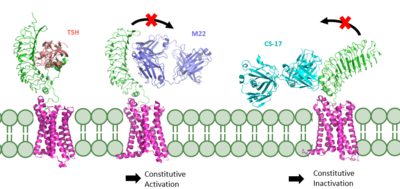We apologize for Proteopedia being slow to respond. For the past two years, a new implementation of Proteopedia has been being built. Soon, it will replace this 18-year old system. All existing content will be moved to the new system at a date that will be announced here.
Sandbox Reserved 1775
From Proteopedia
(Difference between revisions)
| Line 7: | Line 7: | ||
There are 3 main domains of the Thyroid Stimulating Hormone Receptor. First is the <scene name='95/952703/Tmd/2'>Extracellular Domain</scene> shown in green. Region is concave in shape and is made up of primarily beta sheets and rich in Leucines. It is also called the leucine rich region. This is also the domain for key Lysine residues, which play a key role in binding. Second is the <scene name='95/952703/Tmd/4'>Transmembrane Domain</scene> shown in pink. This domain is made up of 7 helices and undergoes a conformation change upon ligand binding that activates the GPCR signal cascade (GPCR is shown in yellow). The Third region of the TSHR is the <scene name='95/952703/Tmd/3'>Hinge Region</scene> shown in orange. The Hinge Region plays a key role in the movement and stability of the TSHR. | There are 3 main domains of the Thyroid Stimulating Hormone Receptor. First is the <scene name='95/952703/Tmd/2'>Extracellular Domain</scene> shown in green. Region is concave in shape and is made up of primarily beta sheets and rich in Leucines. It is also called the leucine rich region. This is also the domain for key Lysine residues, which play a key role in binding. Second is the <scene name='95/952703/Tmd/4'>Transmembrane Domain</scene> shown in pink. This domain is made up of 7 helices and undergoes a conformation change upon ligand binding that activates the GPCR signal cascade (GPCR is shown in yellow). The Third region of the TSHR is the <scene name='95/952703/Tmd/3'>Hinge Region</scene> shown in orange. The Hinge Region plays a key role in the movement and stability of the TSHR. | ||
| - | + | == Binding of Thyroid Stimulating Hormone to TSHR== | |
<scene name='95/952703/Tsh-ecd/2'>TSH binds to the extracellular domain</scene> by complementary shape and several polar/nonpolar interactions | <scene name='95/952703/Tsh-ecd/2'>TSH binds to the extracellular domain</scene> by complementary shape and several polar/nonpolar interactions | ||
<scene name='95/952703/Seatbelt/1'>Seat Belt region of TSH</scene> Words... | <scene name='95/952703/Seatbelt/1'>Seat Belt region of TSH</scene> Words... | ||
| Line 13: | Line 13: | ||
<scene name='95/952703/Tsh-tshr_itxn-2/1'>Second interaction</scene> words.... | <scene name='95/952703/Tsh-tshr_itxn-2/1'>Second interaction</scene> words.... | ||
<scene name='95/952703/Tsh-tshr_itxn-4/1'>Polar and nonpolar interactions</scene> Words.... | <scene name='95/952703/Tsh-tshr_itxn-4/1'>Polar and nonpolar interactions</scene> Words.... | ||
| + | |||
| + | == Blocking TSHR in Active/Inactive States == | ||
[[Image:conformation1.png|400px|right|thumb|Figure Legend]] | [[Image:conformation1.png|400px|right|thumb|Figure Legend]] | ||
| - | |||
| - | == Disease == | ||
| - | |||
| - | == Relevance == | ||
| - | |||
== Structural highlights == | == Structural highlights == | ||
Revision as of 19:57, 31 March 2023
| This Sandbox is Reserved from February 27 through August 31, 2023 for use in the course CH462 Biochemistry II taught by R. Jeremy Johnson at the Butler University, Indianapolis, USA. This reservation includes Sandbox Reserved 1765 through Sandbox Reserved 1795. |
To get started:
More help: Help:Editing |
Your Heading Here (maybe something like 'Structure')
| |||||||||||

